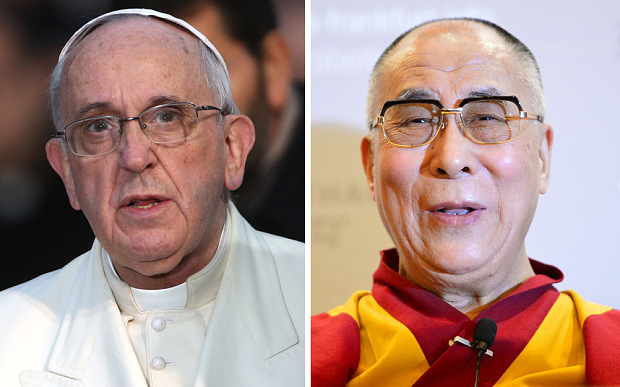Pope Francis recently declined an opportunity to meet with the Dalai Lama, apparently after deciding that the meeting could “cause inconveniences” with Chinese authorities. While the Chinese government routinely pressures foreign governments from meeting with the Dalai Lama, the Tibetan spiritual leader has regularly met with previous popes, though this would have been his first meeting with Pope Francis. In the New York Review of Books, Jonathan Mirsky writes that Pope Francis’ decision differs from that of heads of state who decline to meet the Dalai Lama:
What happened in Rome is wholly different. Unlike the US, Britain, Norway, and South Africa, among other countries, the Vatican has no economic ties with Beijing, nor does it hold security discussions with the Chinese. It is also usual for the Pope to meet the leaders of other world faiths on purely religious grounds.
What is plain is Francis’s anguish over the fate of the estimated twelve million Chinese who are Catholic and the more than three thousand Catholic priests active in China. About half of China’s Catholics are connected to one of the churches under the Chinese Patriotic Catholic Association (CPCA), which means their bishops are appointed by employees of CPCA, which was created by the Religious Affairs Bureau of the People’s Republic; the other half are unofficial “House Christians,” who recognize the pope as their leader. Along with China’s Protestants, both groups have at best uneasy relations with the Communist leadership. Earlier this year, Catholic and Protestant churches in some regions of China were designated as “illegal structures” and demolished; in other cases in recent months, Christian religious symbols, such as crosses, have sometimes been forcibly removed.
Evidently, the Vatican understood what could happen if the Pope met “the criminal, splittist Dalai,” as he is routinely condemned by Beijing. There is always the possibility of detentions of prominent Catholics and their priests, and more punishments for Tibetan Buddhists, well-tried forms of Communist persecution. There also could be more at stake now that Beijing has signaled that it might consider improving relations with Rome. The signal seems arcane but it was understood in the Vatican. During the Pope’s visit to South Korea, for the first time a plane carrying a pope was permitted to fly through Chinese air space. In response, as he passed over China, the Pope sent a message to President Xi Jinping: “I extend the best wishes to Your Excellency and your fellow citizens, and I invoke the divine blessings of peace and well-being upon the nation.” [Source]
Read more about China’s relations with the Vatican, Pope Francis, and the Dalai Lama, via CDT.








